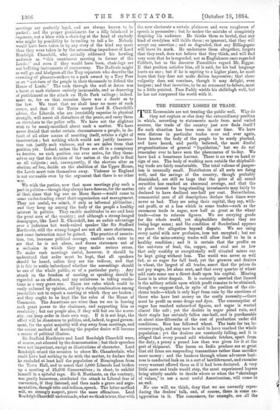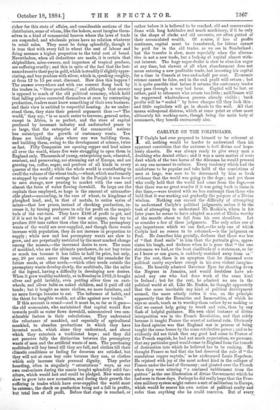THE PRESENT LOSSES IN TRADE. T HE Economists are not treating
the public well. Why do they not explain or else deny the extraordinary position in which, according to statements made from most varied sources, the trade of the country just now finds itself I No such situation has been seen in our time. We have seen distress in particular trades over and over again, have known the body of the people to be sorely pinched, and have heard, and partly believed, the most direful prognostications of general "liquidation," but we do not remember ever to have seen the phenomena of to-day. We have had a bounteous harvest. There is no war on hand or sign of one. The body of working men outside the shipbuild- ing trade are fairly comfortable. The total volume of pauper- ism is unusually small. Distributors of all sorts are doing well, and the savings of the country, though probably diminished, are still so large that the price of all sound securities has reached an abnormal average, and that the rate of interest for long-standing investments may fairly be declared to have declined one-half per cent. Nevertheless, commercial men of all descriptions declare that times were never so bad. They are using their capital, they say, with- out profit, or at a loss which in some trades—such as the enormous trade in sugar, now half as great as the wheat trade—rises to ruinous figures. We are carrying goods for the whole world, yet shipbuilders declare they are losing huge sums ; and the condition of Sunderland appears to place the allegation beyond dispute. We are using every metal with new profusion, iron not excepted ; but not one of the mine-owning trades will allow itself to be in a healthy condition ; and it is certain that the profits on the out-turn of lead, tin, copper, and coal are so low that only wealthy or exceptionally well situated mines can be kept going without loss. The world was never so well fed, or so eager for full food, yet the growers and dealers in wheat, the largest of all trades, assert that the prices do not pay wages, let alone rent, and that every quarter of wheat sold costs some one a direct draft upon his capital. Mincing Lane is in utter despair. It is currently asserted that linseed is the solitary article upon which profit remains to be obtained, though we suppose that, in spite of the position of the cin- chona trade—which is only kept from ruin by the exertions of those who have lent money on the costly necessity—there must be profit on some drugs and dyes. The consumption of sugar has reached unheard-of figures, and sugar is wasted almost like salt ; yet the dealers in sugar plead ruin, and their staple has certainly fallen one-half, and is purchasable at about nine-fifteenths of the cost of production under old conditions. Rice has followed wheat. The taste for tea in- creases yearly, and may now be said to have reached the whole population ; yet the dealers are constantly failing, and it is alleged that every pound sold wholesale fetches, apart from the duty, a penny a pound less than was given for it at the port of shipment. The losses on India produce are so great that old firms are suspending transactions rather than sacrifice more money ; and the bankers through whose advances busi- ness is conducted look on in a sort of bewilderment, and examine every warrant offered them as if it had been doctored. A very little more and trade would stop, the most experienced buyers being utterly unable to decide where or when the "shrinkage of values," to use a most useful Americanism, will come to an end.
No one will, we think, deny that we are correctly repro- ducing the dealers' talk, and, of course, there is some ex- aggeration in it. The consumers, for example, are all the richer for this state of affairs, and considerable sections of the distributors, some of whom, like the bakers, must imagine them- selves in a kind of commercial heaven where the laws of trade are suspended, and wholesale prices have no relation whatever to retail sales. They must be doing splendidly, though it is true that with every fall in wheat the cost of labour and firing assumes a higher proportion to the total cost of bread. Nevertheless, when all deductions are made, it is certain that shipbuilders, mine-owners, and importers of tropical produce, are suffering cruelly; and this in spite of the fact that the last- named receive their pay in gold, which is steadily if slightly appre- ciating, and buy produce with silver, which is, speaking roughly, at from 12 to 15 per cent. discount. How does this happen ? The answer everywhere and with one consent flung back by the traders is, "Over-production ;" and although that answer is opposed to much of the old political economy, which held that falling prices corrected themselves at once by contracting production, traders must know something of their own business, and their view is entitled to respectful hearing. As we under- stand them, they state their general argument thus :—" The world," they say, "is so much easier to traverse, general order, except in Africa, is so perfect, and the store of capital produced by incessant industry and undisturbed peace is so large, that the enterprise of the commercial nations has outstripped the growth of customary wants. Ten firms are building ships where one was building them, and building them, owing to the development of science, twice as fast. Fifty Companies are opening copper and lead mines all over the world, where five were struggling to open them in England only. Thousands of young, enterprising men, educated, esurient, and persevering, are streaming out of Europe, and are growing tea, coffee, sugar, and produce of all kinds in every quarter of the world ; while the whole world is contributing to swell the volume of the wheat trade,—wheat, which was formerly so stopped by costs of carriage that in the Punjab it was burnt to save storage, now pouring to market with the ease and almost the force of water flowing downhill. So large are the capitals thus employed, so huge is the amount of untransfer- able plant—amounting, in the case of wheat, to kingdoms of ploughed land, and, in that of metals, to entire series of mines—that low prices, instead of checking production, in- crease it, by forcing producers to rely for profit on the magni- tude of the out-turn. They have £100 of profit to get, and if it is not to be got out of 100 tons of copper, they try to produce 200 tons rather than close the mine. The peremptory wants of the world are over-supplied, and though those wants increase with population, they do not increase in proportion to supply ; while new and less peremptory wants are slow to grow, and are perpetually restricted by the most marked change among the masses,—the increased desire to save. The mass of mankind, who are the ultimate purchasers, do not buy twice as much tea because it has fallen to half its price, but only, say, 20 per cent, more than usual, saving the remainder for future needs, or other needs,—which other needs outside the peremptory wants develop slowly, the multitude, like the sailor of the legend, having a difficulty in developing new desires. When it grew wealthy suddenly, as in Bombay in 1862, it bought silver and gold lavishly, even putting silver tires on cart- wheels, and silver belts on naked children, and it paid off old bonds ; but it bought no more clothes, no more furniture, and no more foreign luxuries to eat. The influence of habit, and the thirst for tangible wealth, act alike against new trades."
If this account is sound—and it must be, so far as it goes— the old economists, who maintained that capital would flow towards profit as water flows downhill, misconceived two con- siderable factors in their calculations. They underrated the reluctance of mankind, and especially of agricultural mankind, to abandon productions in which they have invested much, which alone they understand, and about which they entertain a traditional hope ; and they did not perceive fully the distinction between the peremptory wants of men and the artificial wants of men. The purchasing multitude will buy bread till they are full, and clothes till their climatic conditions or feeling for decorum are satisfied, but they will not at once buy cake because they can, or clothes which only increase their personal dignity. They prefer hoarding, often in singularly " ostentatious " ways, as our own coal-miners during the mania bought splendidly solid fur- niture, which would last and could be pledged. New wants are slow to grow into new necessities, and during their growth the suffering in trades which have over-supplied the world must be extreme, the check on production being not a fall in profits, but total loss of all profit. Before that stage is reached, or rather before it is believed to be reached, old and conservative firms with long habitudes and much machinery, if it be only in the shape of clerks and old accounts, are often gutted of their accumulated wealth. Of course, if loss of profits continues, capital must be transferred, for labour cannot be paid for in the old trades, as we see in Sunderland ; but the transfer is slow, more especially when the alterna- tive is not a new trade, but a lock-up of capital almost with- out interest. The huge sugar-dealer is slow to abandon sugar at any time, but slowest of all when abandonment does not mean entering a new profitable trade, but investing his capital for a time in Consols at two-and-a-half per cent. Economic science cannot be false, and in the end profit will return ; but it is quite possible that before it returns the customary trades may pass through a very bad hour. Capital will be lost, or rather, paid to labourers who return too little ; middlemen will be suppressed wholesale—a process already visible ; bank profits will be " scaled " by lower charges till they look thin ; and little capitalists will go in shoals to the wall. All that means widespread distress, which at some point or other must ultimately hit working-men, though being the main body of consumers, they benefit enormously also.



































 Previous page
Previous page